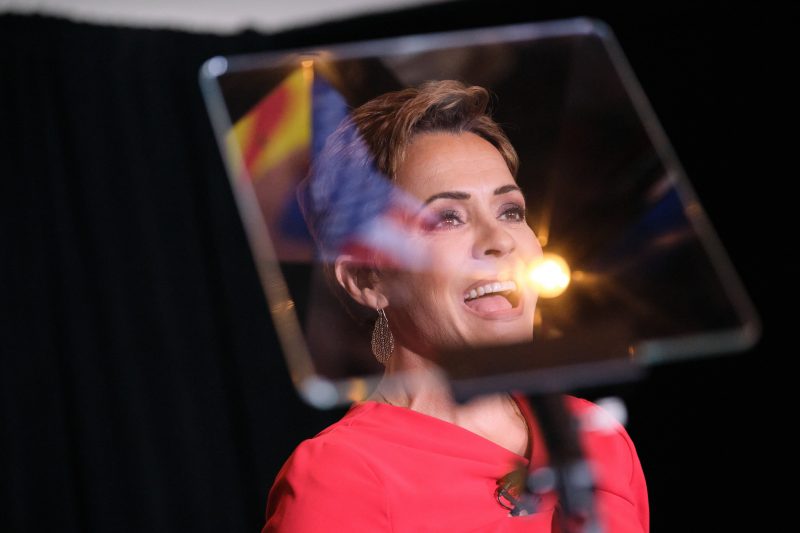Kari Lake lost the Arizona gubernatorial election by about 17,000 of the votes cast by Nov. 8, 2022.
She lost the election in the mind of the public when it was called by the Associated Press on Nov. 14. She lost officially when the election was certified on Dec. 5.
She lost the election again on Dec. 24, when a judge threw out a legal challenge to the results. She lost again on Feb. 17 when her appeal was denied. And she lost again on Monday, when a court rejected her argument that flaws in the process for counting absentee ballots warranted reconsideration of the contest.
That’s something like six losses in the same contest, if you’re counting. But Lake is as unchastened as she was on Nov. 9, when — after earning Donald Trump’s endorsement by echoing his false claims about election fraud — she began claiming that her own loss was tainted. In the aftermath of that most recent legal rejection, she retweeted a meme suggesting that the way in which absentee ballots were counted was suspect.
But let’s table Lake for a moment. Let’s instead talk about globes.
Kandiss Taylor also ran for governor last year, coming in third in Georgia’s Republican primary. On Monday, a snippet of an interview she conducted with a flat-Earther — that is, someone who claims our planet isn’t round — circulated online.
In it, Taylor endorses the idea that the Earth is flat, not by citing evidence but by pointing out the pervasiveness of representations of a non-flat Earth.
Kandiss Taylor, who ran for governor in 2022 and recently became a Georgia GOP district chair, is a flat earther: ‘Everywhere there’s globes … and that’s what they do to brainwash.’ pic.twitter.com/PEz1sqOTvA
— Right Wing Watch (@RightWingWatch) May 22, 2023
“Everywhere, there’s globes. You see them all the time,” Taylor said. “ … They’re everywhere. And that’s what they do to brainwash.”
“For me, if it is not a conspiracy, if it is real, why are you pushing so hard?” she added.
You will not be surprised to learn that, despite losing the Republican gubernatorial primary by 70 points last year, Taylor also claimed the election was tainted by fraud.
That globe argument, though, is revealing. A normal person would assume that representations of the Earth are round because the Earth is round — and, importantly, probably wouldn’t even notice many such representations in their day-to-day lives. Sitting here writing this, I’m hard-pressed to recall when I last saw a globe.
But Taylor has chosen to notice them (or has chosen to claim that she notices them). And in doing so, she has become suspicious (or has chosen to claim to be suspicious). Why are all of the globes globes, if not to cover up the truth — that the Earth isn’t a globe!
Taylor has perhaps never seen a Mercator-projection map, but I digress.
This is how it works. You can always find evidence for your point of view, given two conditions. First, that you don’t see or you’re willing to ignore countervailing evidence. Second, that you have a reason for investing so heavily in your point of view.
For Lake, that second element is easy to establish. Lake’s entry into politics was predicated on the idea that the system couldn’t be trusted. Yes, she’d have liked to have won the gubernatorial election, but it was hardly an obstacle that she didn’t. She held the same position on the legitimacy of elections the month before she lost and the month after. The election on Nov. 8 was not determinative, it was a data point.
In so doing, she’s done something other losing candidates haven’t: She has retained the spotlight. On Nov. 8, 2022, Lake had about 550,000 followers on Twitter. Now she has 1.2 million. Some of that is likely a function of Elon Musk inviting conspiracy theorists back to the platform. But some of it is that Lake’s campaign against the establishment — and, more broadly, against reality — has continued unabated.
This means she has fulfilled the first of our two conditions: She’s weeding out countervailing evidence.
We often think that correcting errors or providing context for false claims is futile. As a member of the traditional, reality-adherent media, I can confirm that it often feels that way. But research shows that it isn’t.
The problem is that many people don’t see fact checks. The splintering of the media universe over the past decade, with the expansion of social media and the emergence of news outlets predicated on advancing partisan agendas has made it particularly easy to avoid countervailing evidence.
Lake is immersed in right-wing media. She celebrates — and fundraised off of — her rejection of outlets like CNN. She rejects or ignores the overwhelming evidence that Trump lost in 2020 and that she lost two years later. So she frames her failure to become governor not as the legitimate verdict of Arizona voters but as part of a divine plan to expose the fraud that obstructed her path.
She and Trump have used the “globes” argument regularly: If there wasn’t fraud, why is the media so eager to point out that there was no fraud? So they beat on, boats against the current of reality, borne back ceaselessly into the past.
On Monday, Lake teased an imminent announcement; it’s likely that she’ll announce her candidacy for the Republican Senate nomination in Arizona next year. But she’s already running the same campaign she’s been running for the past few years, one in opposition to the elites and the know-it-alls and the fake-news media who all insist that things are the way they are.








